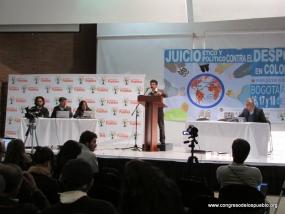An activist tribunal dubbed the Ethical Trial against Plunder (Juicio Ético contra el Despojo) was held in Bogotá over the weekend to air testimony against the practices of multinational gold firm Anglo Ahshanti (AGA) and oil giant Pacific Rubiales Energy (PRE). More than 500 representatives from across Colombia convened in the capital's central folk-crafts market, the Plaza de los Artesanos, to present evidence that the multinational corporations were involved in the murder of union leaders, displacement of indigenous communities, and grave environmental damage. The objective was to gather enough evidence to be able to put forward an real legal case.
South African AGA arrived in Colombia in 2003 and is seeking to establish gold mines at Gramalote, Norte de Santander, and at La Colosa, Tolima. AGA is accused of involvement in the murder of artisenal miners' union leader Alejandro Uribe Chacón in September 2006. A government investigation into his suspicious death at the hands of the Colombian army culminated on Feb. 28 of this year, when the Prosecutor General cleared three soldiers, finding that Uribe Chacón was caught in a fire-fight between the soliders and ELN guerillas. Advocates say this ruling is at odds with forensic evidence showing that Uribe Chacón had been shot six times, including twice from point-blank range.
AGA is also accused of intimidating local residents. Tefilo Acuña, who founded the South Bolívar Federation of Agro-Miners in the South of Bolivar (FEDEAGROMISBOL) in 1998 and was a personal friend of Uribe Chacón, told the tribunal how he had been detained in April 2007 by the Colombian army on suspicion of "being against mining." He was released after 10 days thanks to a national and international protest campaign.
Also giving evidence against AGA were members of the Afro-Colombian community of La Toma, near Cali. They referred to repeated attempts by AGA to evict them from their ancestral lands, where they have panned for gold for nearly 400 years.
Canadian-based PRE has been in Colombia since 1982, and is the country's largest extractor of oil after state-owned Ecopterol. PRE recently reported record oil and gas production for the second quarter of 2013, building on the record levels achieved in the first quarter. In July, Colombian oil workers union USO filed a complaint with the Prosecutor General alleging that PRE is trying to undercut independent labor organizing by setting up their own union, dubbed the UTEN. "We feel like we’re fighting against a monster," said USO president Rodolfo Vecino, who says he has received death threats from paramilitaries.
Backed by NGO Proyecto Gramalote, workers accused PRE of threatening to fire workers who joined independent unions. The company has reacted strongly to the claims. "That's just patently absurd," said legal counsel Peter Volk in July. "There's no way our company would involve itself in any threats or physical violence with any worker."
Another accusation leveled against PRE concerned its treatment of the indigenous Sikuani community near its operations area in Meta department. An agreement was signed between the Sikuani and PRE in 2010, in which the company pledged to allocate funds for improving local roads and other infrastructure. Earlier this year the Sikuani joined with the National Indigenous Organization of Colombia (ONIC), to pressure PRE to finally make good on their promises.
"We reject the concessions that the government has made to [PRE] in these indigenous lands," an ONIC statement says. "Not only have they allowed the indiscriminate looting of natural resources but they have let people fall into extreme poverty."
The Sikuani people are one of the 34 indigenous peoples in Colombia considered by the UN High Commission for Refugees (UNHCR) to be close to extinction, and should therefore be protected under special laws. (Colombian indigenous organizations have placed the figure higher.) According to ONIC, the presence of PRE in indigenous territory is the cause of "discrimination, environmental damage, alcoholism, vices, and prostitution." The company is accused of contaminating local water sources, leading to chronic skin conditions.
PRE has also had conflicts with Colombia’s government. In 2011, the company threatened to halt production unless the government gave certain guarantees over security, and in 2012 the government opened an investigation into claims that PRE had tried to obstruct environmental regulation by giving false information to authorities.
The tribunal was attended by activists from Ecuador, Bolivia and Canada as well as from impacted regions of Colombia. After a protest against Pacific Rubiales in Puerto Gaitán, Meta, last month, Dave Coles, national president of the Communications, Energy and Paperworkers Union of Canada told news website Colombia Politics: "The state of Colombia is owned lock, stock and barrel by the oil companies. They tell them what to do. The army is directed to de-unionize the energy sector. The army is directed to violate human rights and it is done with complete immunity. The state condones it." (Colombia Reports, Colombia Informa, Aug. 19)
Originally published
http://ww4report.com/node/12544